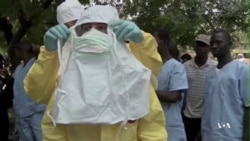The World Health Organization (WHO) calls the Ebola outbreak in West Africa among the most challenging ever. The organization reports the virus has killed 101 people in Guinea and 10 in Liberia.
Ebola is one of the world's deadliest viruses and the humanitarian organization Doctors Without Borders is helping local health care workers in Guinea treat Ebola patients. The fatality rate for the strain that has broken out in Guinea is up to 90 percent.
The virus has spread to the capital, Conakry, from forests in the south. The WHO is concerned that Ebola has broken out in a region where it had never appeared before.
But Dr. Anthony Fauci, director of the infectious diseases division at the National Institutes of Health (NIH), says Ebola's appearance in West Africa should not come as a surprise.
“It’s a disease that’s spread by direct contact with an infected person, but it’s also spread by exposure to an infected animal like a bat," Fauci said. "And since we know those animals are in those areas of those adjacent countries, it’s not that unusual to see outbreaks in areas of southern Africa that are adjacent to each other."
Fruit bats are the primary carriers of Ebola, although the virus doesn't kill the bats. Humans get the virus from infected bats or other animals that these bats come in contact with. Fauci says people should avoid eating bush meat and bats when there's an outbreak of Ebola.
The symptoms are very much like those of the flu: fever, weakness, muscle pain, headache and sore throat. But that's where the comparison ends. The next stage in Ebola is vomiting, diarrhea, and in some cases, internal and external bleeding. The flu is airborne, Ebola is not.
"Ebola is almost invariably spread by direct contact with bodily fluids, particularly blood and secretions - vomit, things like that - of people who are deathly ill and people are taking care of them, so it’s usually family members, health care providers, ministers who minister to the sick and to the dead, and to morticians who take care of the bodies," Fauci said.
The best way to control the virus is to get people with symptoms into isolation wards. Researchers are trying to find effective medications, but at the moment the best chances of beating the disease are to drink plenty of fluids and get treated for secondary infections such as diarrhea.
A number of patients in Guinea have recovered and have been discharged from treatment centers. But doesn't mean they are completely free of Ebola.
The WHO reports that men who have recovered from the disease can still transmit the virus to sex partners for up to seven weeks after they recover.
Ebola is one of the world's deadliest viruses and the humanitarian organization Doctors Without Borders is helping local health care workers in Guinea treat Ebola patients. The fatality rate for the strain that has broken out in Guinea is up to 90 percent.
The virus has spread to the capital, Conakry, from forests in the south. The WHO is concerned that Ebola has broken out in a region where it had never appeared before.
But Dr. Anthony Fauci, director of the infectious diseases division at the National Institutes of Health (NIH), says Ebola's appearance in West Africa should not come as a surprise.
“It’s a disease that’s spread by direct contact with an infected person, but it’s also spread by exposure to an infected animal like a bat," Fauci said. "And since we know those animals are in those areas of those adjacent countries, it’s not that unusual to see outbreaks in areas of southern Africa that are adjacent to each other."
Fruit bats are the primary carriers of Ebola, although the virus doesn't kill the bats. Humans get the virus from infected bats or other animals that these bats come in contact with. Fauci says people should avoid eating bush meat and bats when there's an outbreak of Ebola.
The symptoms are very much like those of the flu: fever, weakness, muscle pain, headache and sore throat. But that's where the comparison ends. The next stage in Ebola is vomiting, diarrhea, and in some cases, internal and external bleeding. The flu is airborne, Ebola is not.
"Ebola is almost invariably spread by direct contact with bodily fluids, particularly blood and secretions - vomit, things like that - of people who are deathly ill and people are taking care of them, so it’s usually family members, health care providers, ministers who minister to the sick and to the dead, and to morticians who take care of the bodies," Fauci said.
The best way to control the virus is to get people with symptoms into isolation wards. Researchers are trying to find effective medications, but at the moment the best chances of beating the disease are to drink plenty of fluids and get treated for secondary infections such as diarrhea.
A number of patients in Guinea have recovered and have been discharged from treatment centers. But doesn't mean they are completely free of Ebola.
The WHO reports that men who have recovered from the disease can still transmit the virus to sex partners for up to seven weeks after they recover.











